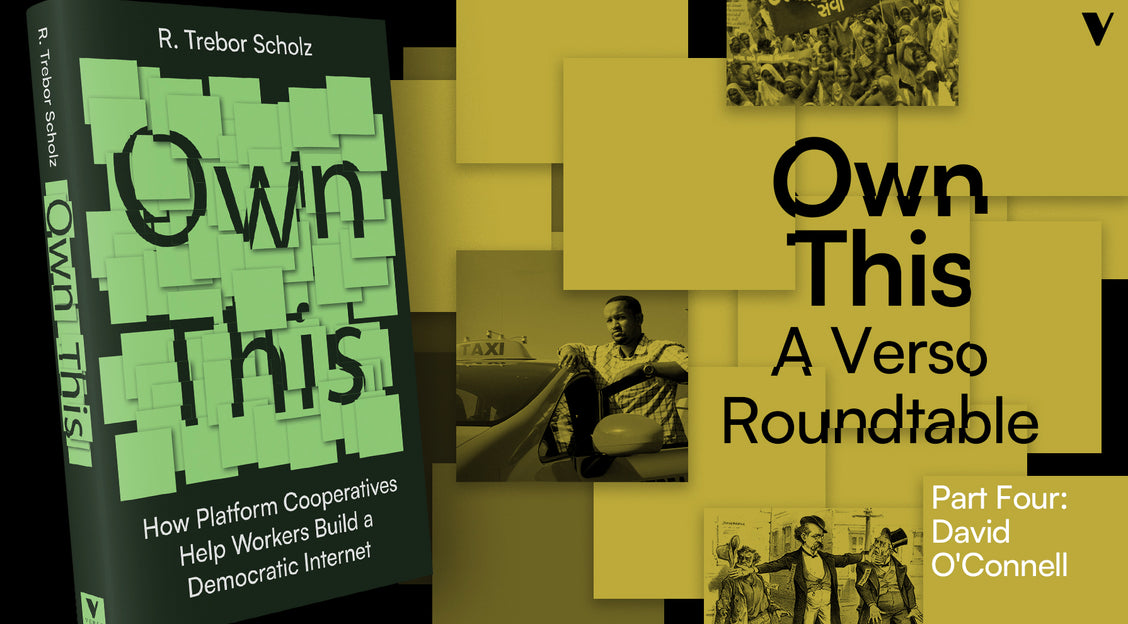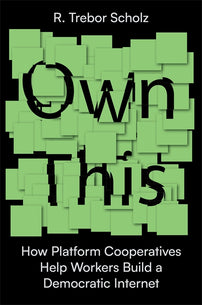Cooperating with cooperatives: how unions need to think Bigger
In part 4 of our Own This! roundtable, David O'Connell explores the relationship between trade unions and workers' cooperatives.

Trebor Scholz is right, trade unions are in an acute state of decline globally. In the United States for example, union membership is down to as low as 7% in the private sector, forcing existential questions about the future of the labour movement itself. Gar Alperovitz paints a stark picture of the situation, pointing out that unions are not only struggling to protect workers against rampant capitalism, but are no longer able to function as the motor of progressive political campaigns, or push for “liberal redistributive strategies” — forcing unions into ultimately “uncharted territories”. While this might be an extreme case, the same situation is playing out in almost every country in the world, and the responses to this are somewhat lacking.
The reasons for this decline are well-researched. To some extent the decline is ‘cyclical’, determined partially by business cycles that come and go, so while the picture is troubling, there’s reason to expect an impending upswing. In other ways the problem is much more permanent, with unions being subjected to technological and spatial fixes such as offshoring and automation from which there is no going back. This is particularly the case in the platform economy, where technological developments are creating entirely new forms of employment, to which unions are slow to respond.
It's tempting to see unions as being pushed helplessly around by these much bigger trends — but the unions themselves also bear some of the blame for their own situation, by not adapting and responding to these threats effectively. In fact, there's a tendency to focus on “fortifying myths” that frame both successes and failures in very comfortable and often very self-aggrandising terms. In this sense, trade union defeats are as noble as successes, and a certain fossilisation of discourse sets in that pitches ‘big organising’ as advanced by titans of the movement such as Jane McAlevy in opposition to an old and stuffy ‘service unionism’.
This overlooks the immense growth of the cooperative sector, which is ‘organising’ workers in the platform economy in a totally different way. Bringing decent pay and conditions, workplace democracy, and formal employment. Efforts to find innovative pathways to union revitalisation usually miss this out entirely. Notably, when the Friedrich Ebert Foundation launched the “Trade Unions in Transformation” series to look at successful union responses to changing world of work, ‘industry 4-0’ and the platform economy, they omitted almost any mention of the progressive role of cooperatives, and their potential to help rebuild organised labour — even within case studies of union which have extensive and positive experiences with cooperatives. This is really where Trebor makes a valuable and timely contribution to the discussion, bringing to the fore numerous contemporary examples of very real successes which seem to be going overlooked in the mainstream.
[book-strip index="1"]
While trade unions and cooperatives have almost the same goals, and, as Scholz also notes in Own This!, the same origins, they do adopt quite different strategies to meet those ends. Trade unions focus on improving conditions in the workplace through collective bargaining, worker representation, and political lobbying. Meanwhile workers cooperatives seek to improve the conditions of their own members through democratic ownership and successful competition within a market. As a result, trade unions tend to bring up three main concerns with cooperatives, which along with their limitations are worth considering in brief:
“Worker cooperatives are nice and everything, but they are a distraction from ‘real’ trade union work” — this understands “real” trade union work to be roughly as described: improving workers conditions through collective bargaining, social dialogue, the development of sound industrial relations and political lobbying. Through these means, backed up by the ability of the workers to disrupt capital through strike action, unions have been the single greatest force for social and economic progress in history.
But trade unions have been a bit more than this too. Even outside of the overtly revolutionary left, they often professed much loftier visions of industrial democracy, worker ownership and a cooperative commonwealth. As the Miners leader Alexander Macdonald warned delegates in 1871 “not to lose sight of the principle of co-operative production but to go for it in heart and soul”. Today this is an important fringe position within the labour movement, as most major unions in the post war period traded in questions of ownership and workplace democracy for a more established institutional role within capitalist economies.
Framing collective bargaining and cooperative ownership as competing forms of activity is a misnomer. In reality, fighting for collective bargaining agreements which cover whole industries, and the development of platform cooperatives in sectors which are traditionally difficult to organise, are complimentary, not contradictory strategies. The Confédération des Syndicats Nationaux in Quebec, for example, has no difficulty pursuing traditional organising methods, while at the same time having established its own investment bank, La Caisse Solidaire Desjardins, which finances the development of a Social Solidarity Economy in strategically useful industries. Supporting the development of both startup cooperatives and the takeovers of insolvent firms to protect employment. Through this, the Caisse was also able to help Brazil's Metalworkers Union in take over Latin America's largest industrial forge, Unifora, which still operates successfully today as a cooperative enterprise.
“There’s no role for a union in a democratic worker cooperative” — In reality, cooperatives may benefit massively from union representation. Not only can unions provide worker-owners with another mechanism to address grievances while giving them representation and protection, they also work as a safeguard against cooperative degeneration of ‘mission drift’, encouraging cooperatives to protect worker interests. Unions also bring external infrastructure such as credit unions, which can help new employee buy-in to cooperatives which are built on share ownership models.
The union-cooperative model, developed jointly between Mondragon and the United Steelworkers in 2009, provides an excellent template for cooperatives to use, giving workers the ability to govern their own company democratically, while also electing union representation which is independent of the management. This model has been used successfully in places like the Our Harvest cooperative, organised by The United Food And Commercial Workers Union (UFCW). Other examples of highly well organised worker owned and unionised enterprises are by no means hard to find, and in no way restricted to only small enterprises, with huge retail firms like Homeland Inc or steel plants like Weirton demonstrating that it is possible at scale.
[book-strip index="1"]
On the macro scale, unions can also implement industry-level collective bargaining agreements into the cooperatives, bringing them into line with industry standards and preventing destructive wage-wars which can create downward spirals. Through these means they can help embed the cooperative in a social movement which brings them closer into alignment with cooperative principles 6 and 7. In short, there's a huge role for unions to place in a democratic worker cooperative, which benefits both unions and coops.
“Worker cooperatives don't necessarily improve wages or conditions” — The union organiser and author of “the Case Against Worker Ownership” Mike Slott, argued that cooperatives basically just comprised the “crumbs” of the economy, and were especially prone to economic failure. To survive, it is suggested, cooperatives will therefore engage in savage self-exploitation, and prioritise economic survival over decent pay and conditions. This in turn, drags down the wages in the entire industry.
On the contrary however, cooperatives have a far better economic record than their traditionally structured counterparts. It is true that cooperatives may cut wages or conditions in some cases, but this is usually as an alternative to layoffs. For example, during the 2008 financial crash, the cooperative sector in the EU absorbed the economic damage they faced through temporary pay cuts and reduced hours but maintained full employment. This approach not only ensured their members all kept an income during a depression, but it also actually strengthened the positions of workers in general by staving off unemployment.
Overall, these three main concerns are not without any basis. Uninformed and haphazard engagement in cooperative endeavours can absolutely backfire on unions which don’t know what they are doing, costing them resources which they could otherwise have spent organising. Cooperative members may also wonder what the point of a union is, and history is certainly littered with examples of poorly thought through governance structures which had catastrophic consequences for both the coops and the unions involved. Unions also have valid concerns about wages and conditions, as cooperatives tend to emphasise themes of democracy and ownership over these. However, arising from these important contentions is the obvious fact that they are all reconcilable.
In order to tackle the threats facing organised labour, union-cooperative collaboration — which is extensive in the fringes — needs to be brought into the mainstream of union strategy. In a way this is not only about wages and conditions, but the development of a form of Social Solidarity Economy which can produce lasting gains for workers and the communities in which they live. Moving towards this means getting trade unions and cooperatives to look at the tremendous successes that are happening right now on the ground, and as Trebor Schloz notes: “excavating the shared roots of the original “friendly societies,” unions, and cooperatives” — reviving the idea of the cooperative commonwealth.
← Read Part 3 of our Own This! roundtable
[book-strip index="1"]
